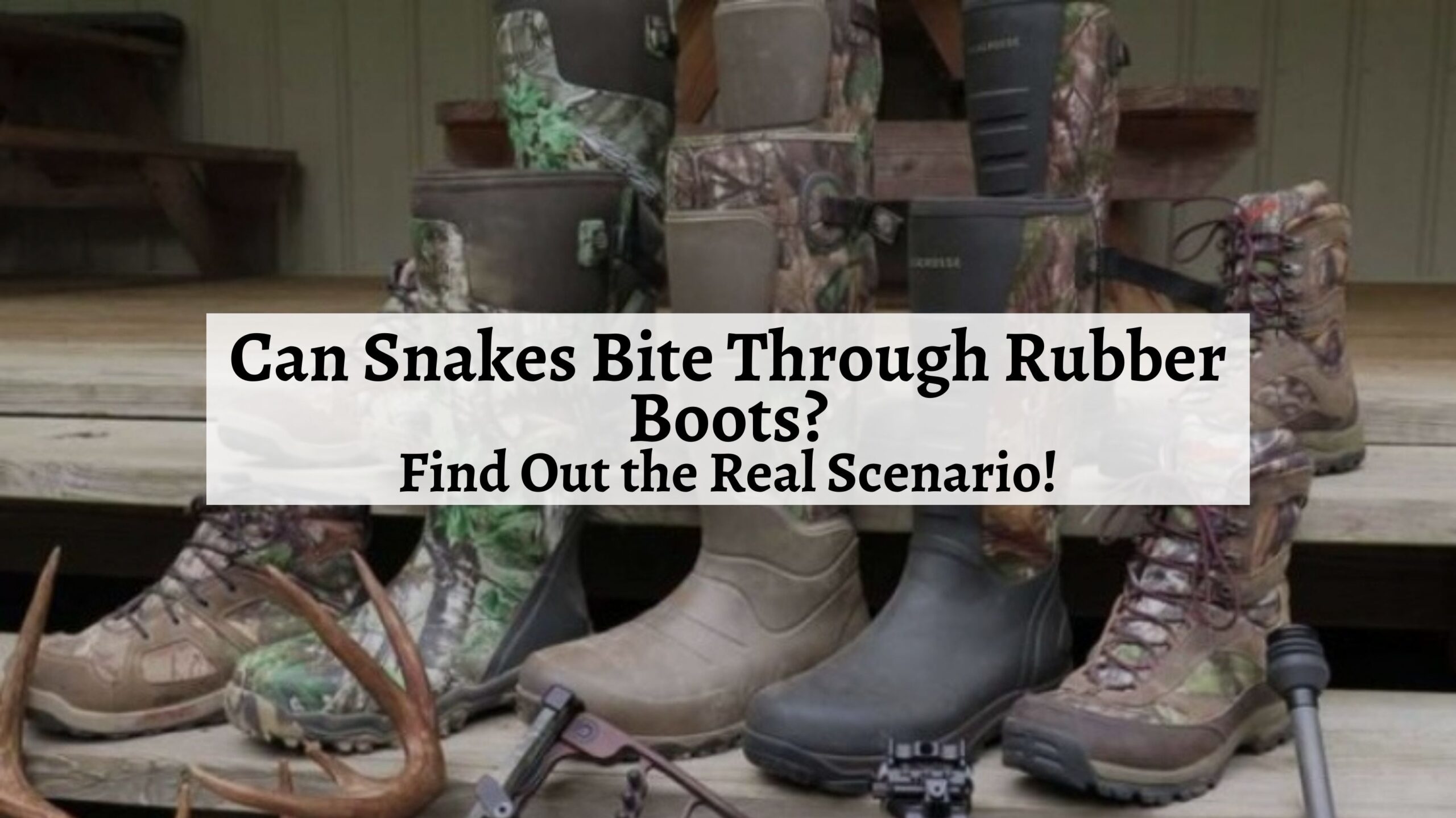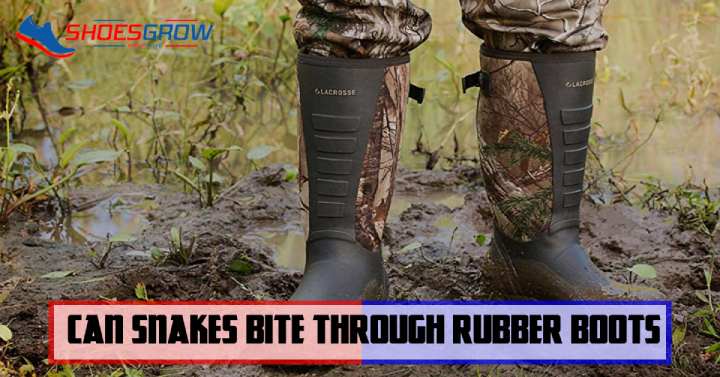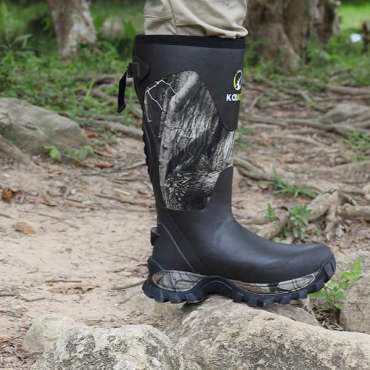Do Snakes Pose a Threat to Your Feet?
The fear of snake bites is a common concern for many outdoor enthusiasts, and for good reason. Snakes are a ubiquitous presence in many natural environments, and their venom can be deadly. But how much of a threat do snakes really pose to our feet? The answer lies in understanding the behavior and anatomy of snakes, as well as the importance of protecting oneself when venturing into snake-prone areas. With the right information and precautions, it’s possible to minimize the risk of snake bites and enjoy the great outdoors with confidence. So, can snake bite through rubber boots? The answer may surprise you.
Can Snakes Really Bite Through Rubber Boots?
The question on everyone’s mind when venturing into snake-prone areas is: can snake bite through rubber boots? The short answer is yes, but it’s not as simple as that. Snakes can exert a significant amount of pressure when biting, with some species capable of generating up to 400 pounds per square inch (psi). Rubber boots, while providing some protection, are not impervious to snake bites. The fangs of a snake can penetrate the rubber, especially if it’s thin or of poor quality. However, the likelihood of a snake bite penetrating a sturdy pair of rubber boots is relatively low. To understand why, let’s delve into the anatomy of snake bites and the limitations of rubber boots as a barrier against snake venom.
How to Choose the Right Boots for Snake-Infested Areas
When venturing into snake-prone areas, it’s essential to choose boots that provide adequate protection against snake bites. While no boot is completely snake-proof, selecting the right pair can significantly reduce the risk of injury. So, what makes a good snake-proof boot? The answer lies in the material, thickness, and design features. Look for boots made from thick, high-quality materials such as full-grain leather or synthetic materials like polyurethane or polyvinyl chloride (PVC). These materials are more resistant to snake bites than thinner materials like rubber. Additionally, consider boots with a snug fit, as loose-fitting boots can leave gaps for snakes to penetrate. Other design features to look for include a high ankle collar, a sturdy sole, and a breathable lining to prevent moisture buildup. By choosing boots with these features, you can minimize the risk of snake bites and enjoy the great outdoors with confidence.
The Role of Boot Material in Snake Bite Prevention
When it comes to preventing snake bites, the material of the boot plays a crucial role. Different materials have varying levels of effectiveness against snake venom, and understanding these differences is essential for choosing the right boots. Rubber boots, for instance, are often considered a popular choice for snake protection, but as we’ve discussed earlier, they are not impervious to snake bites. In fact, rubber boots can be penetrated by snake fangs, especially if they are thin or of poor quality. Leather boots, on the other hand, offer a higher level of protection due to their thickness and density. However, even leather boots can be compromised if they are not made from high-quality, full-grain leather. Synthetic materials like polyurethane or PVC offer a good balance between protection and durability, making them a popular choice for snake-proof boots. Ultimately, the choice of material depends on the specific needs and preferences of the individual, but it’s essential to prioritize protection and durability when venturing into snake-prone areas.
Real-Life Examples: Boots That Have Stood the Test
While theory and research are essential in understanding snake-proof boots, real-life examples can provide valuable insights into their effectiveness. Several boots have been tested in snake-infested areas and have proven to be reliable in preventing snake bites. The Georgia Boot Farm and Ranch, for instance, is a popular choice among outdoor enthusiasts who venture into snake-prone areas. Its thick, high-quality leather and rugged design make it an excellent barrier against snake venom. Another example is the LaCrosse Alphaburly Pro, which features a unique combination of rubber and synthetic materials to provide superior protection. These boots have been tested in the field and have consistently demonstrated their ability to withstand snake bites. While no boot is completely snake-proof, these examples demonstrate that the right boots can significantly reduce the risk of snake bites. By choosing boots that have been tested and proven in real-life scenarios, individuals can increase their confidence and safety when venturing into snake-prone areas.
Additional Safety Measures: Beyond Just Boots
While choosing the right boots is crucial in preventing snake bites, it’s essential to remember that boots are just one part of a comprehensive safety strategy. When venturing into snake-prone areas, it’s vital to combine boots with other safety measures to minimize the risk of snake bites. Long pants, long-sleeved shirts, and gloves can provide additional protection against snake venom. These clothing items can help prevent snake bites by covering exposed skin, making it more difficult for snakes to penetrate. Additionally, wearing protective clothing can also reduce the risk of other outdoor hazards, such as thorns, scratches, and insect bites. It’s also important to stay aware of one’s surroundings, avoiding tall grass and brush, and staying on marked trails. By combining boots with these additional safety measures, individuals can significantly reduce their risk of snake bites and other outdoor hazards, allowing them to enjoy the great outdoors with confidence.
Debunking Common Myths About Snake Bites and Boots
When it comes to snake bites and boots, there are several common myths that can be misleading and even dangerous. One of the most prevalent myths is that certain boots are completely snake-proof. While some boots may offer excellent protection against snake bites, no boot is completely immune to snake venom. It’s essential to understand that even the best boots can be penetrated by a snake’s fangs under certain circumstances. Another myth is that snake bites are always fatal. While snake bites can be deadly, they are often treatable with prompt medical attention. In fact, according to the Centers for Disease Control and Prevention (CDC), the majority of snake bites are not life-threatening. By understanding the facts and debunking these myths, individuals can make informed decisions about their safety and take the necessary precautions to minimize the risk of snake bites. It’s also important to remember that can snake bite through rubber boots is a common concern, but the answer lies in understanding the limitations of rubber boots and choosing the right boots for snake-infested areas.
Conclusion: Staying Safe in Snake Country
In conclusion, venturing into snake-prone areas requires careful consideration and preparation. By understanding the limitations of rubber boots and choosing the right boots for snake-infested areas, individuals can significantly reduce their risk of snake bites. However, it’s essential to remember that boots are just one part of a comprehensive safety strategy. Combining boots with other safety measures, such as long pants, long-sleeved shirts, and gloves, can provide additional protection against snake venom. By debunking common myths and misconceptions about snake bites and boots, individuals can make informed decisions about their safety. Remember, can snake bite through rubber boots is a common concern, but with the right boots and safety measures, individuals can minimize their risk and enjoy the great outdoors with confidence. Stay safe, and stay informed.









